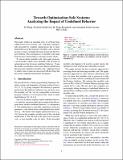Towards optimization-safe systems: analyzing the impact of undefined behavior
Author(s)
Wang, Xi; Zeldovich, Nickolai; Kaashoek, M. Frans; Solar-Lezama, Armando
DownloadKaashoek_Towards optimization.pdf (239.3Kb)
OPEN_ACCESS_POLICY
Open Access Policy
Creative Commons Attribution-Noncommercial-Share Alike
Terms of use
Metadata
Show full item recordAbstract
This paper studies an emerging class of software bugs called optimization-unstable code: code that is unexpectedly discarded by compiler optimizations due to undefined behavior in the program. Unstable code is present in many systems, including the Linux kernel and the Postgres database. The consequences of unstable code range from incorrect functionality to missing security checks.
To reason about unstable code, this paper proposes a novel model, which views unstable code in terms of optimizations that leverage undefined behavior. Using this model, we introduce a new static checker called Stack that precisely identifies unstable code. Applying Stack to widely used systems has uncovered 160 new bugs that have been confirmed and fixed by developers.
Date issued
2013-11Department
Massachusetts Institute of Technology. Computer Science and Artificial Intelligence Laboratory; Massachusetts Institute of Technology. Department of Electrical Engineering and Computer ScienceJournal
Proceedings of the Twenty-Fourth ACM Symposium on Operating Systems Principles - SOSP '13
Publisher
Association for Computing Machinery
Citation
Wang, Xi, Nickolai Zeldovich, M. Frans Kaashoek, and Armando Solar-Lezama. “Towards Optimization-Safe Systems: analyzing the impact of undefined behavior.” Proceedings of the Twenty-Fourth ACM Symposium on Operating Systems Principles - SOSP ’13 (2013), Nov. 3–6, 2013, Farmington, Pennsylvania, USA.
Version: Author's final manuscript
ISBN
9781450323888